Where did the investigation lead us?
- In the difficult decision of 31.3.2023, of just 50 words, on the exclusion of private clinics and rehabilitation centers from the negotiation process of the Committee for the Negotiation of Prices of Compensation for Health Services
- Plevris was asked by Data journalists about the justification of this decision but did not respond
- “Vacuum” of a three-month deadline by the ministry for quality criteria in private clinics, ending in mid-June, when the country will probably be led ungoverned in a second election – But no reference to the Plevris decision on when the exemption expires
- The second decision, together with the Ministry of Finance, on 21.4.2023 for “procedure for the compensation of the use of hospital beds, ICU beds by private providers” with double the salary cost and burden on the EOPPY budget
- Although the government has withdrawn all the protective measures for the pandemic, it cites the “extraordinary conditions of a health crisis that are forming in the country due to the ongoing pandemic”.
- The government’s tolerance of the refusal of the private health sector to contribute to the pandemic and the provocative advertising of its executives, such as the Minister of Development Adonis Georgiadis, to the Thessalian businessman Achilleas Davelis with the masks (recalled by the FDA in 2021 as dangerous to health) and the large rehabilitation center in Larissa
by Vassilis Galoupis
Two decisions that raise a lot of questions were taken by the Minister of Health, Athanasios Plevris, during the election period.
The first is only 50 words, signed by Plevris and without further clarification. Posted in “Diavgeia” on 31.3.2023 and states:
“We decide to exclude Private Clinics and Rehabilitation Centers of Closed Nursing from the negotiation process of the Committee for the Negotiation of Prices of Compensation for Health Services, Medical Devices and Materials of par. 4 of Article 29 of Law 3918/2011 as replaced by Article 5 of Law 4931/2022 (A’ 94)”.
(Pdf)
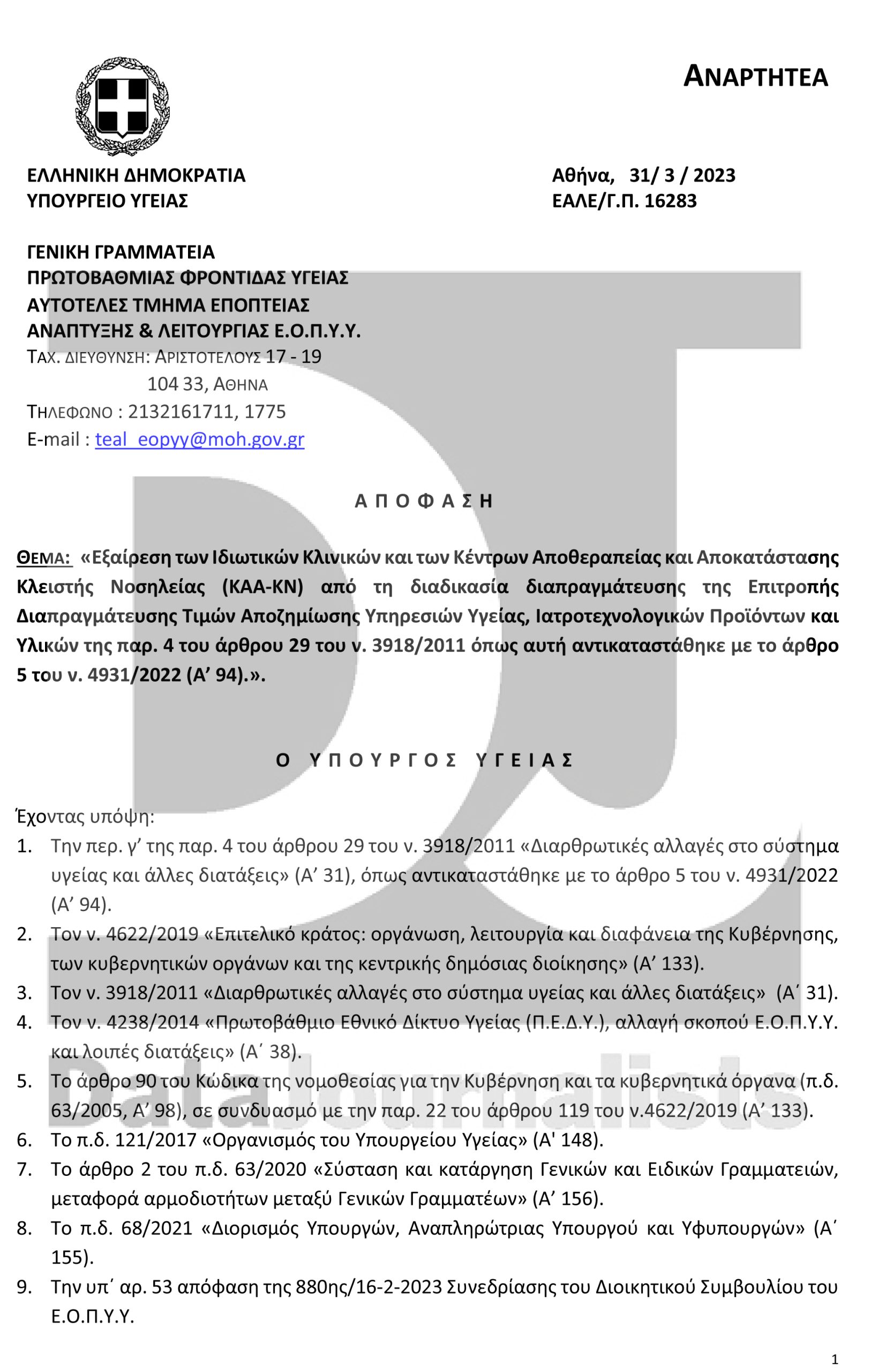
What is noteworthy is that there is no justification or other reference as to why, at this particular time, such a decision was taken to exclude private clinics and rehabilitation centers from the process of negotiating compensation prices. It is simply noted that “this decision does not create an additional financial burden on the budget of EOPYY and does not cause any expenditure at the expense of the budget of the Ministry of Health”.
Data Journalists sent on Tuesday 25.4.2023 an e-mail with questions to the Minister of Health: “Mr. Minister, we would appreciate having your comment on the reason for the exemption, because at this time, how long it will last, but also what was the rationale for deeming this exemption necessary for private clinics and rehabilitation centers.”
In fact, we informed the Minister that we would like to have his reply within 48 hours. Until the time we published our research, we had not received any response from Plevris’ e-mail, as it is officially mentioned on the Ministry of Health website. The relevant decision refers to Article 5 of Law 4931 of 2022. The exemption is referred to point c :
“a) A Committee for the Negotiation of Prices of Compensation for Health Services, Medical Devices and Materials (Negotiation Committee) is established in the EOPYY, which negotiates with all contracted providers with the EOPYY the prices of compensation for services, medical devices, and materials, as well as the terms of the relevant contracts, and recommends to the Board of Directors of EOPYY their maintenance or modification.
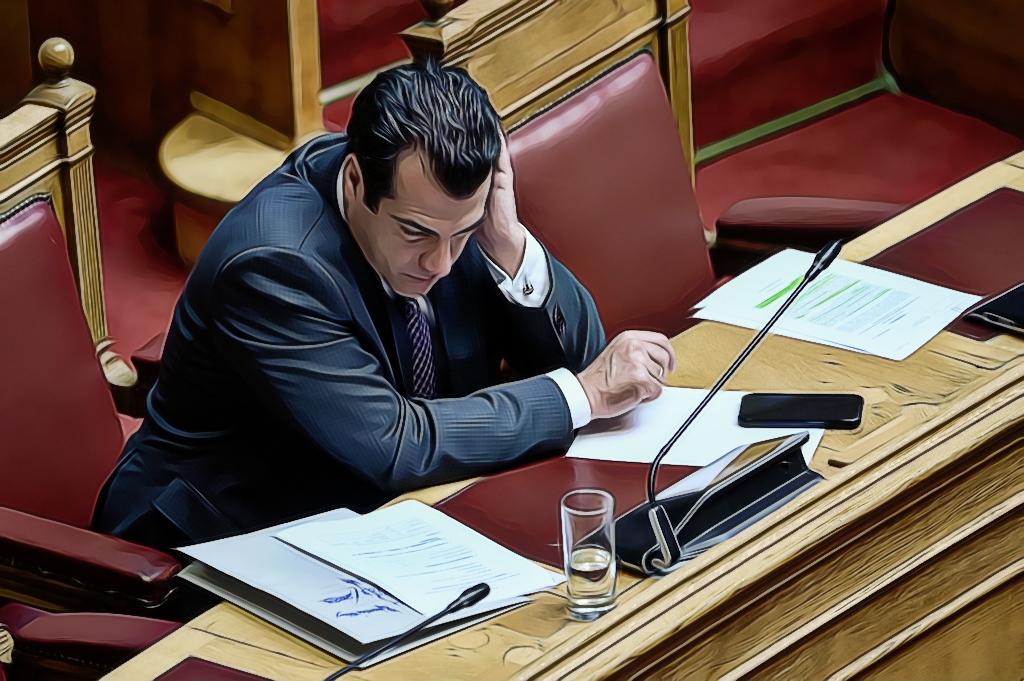
b) By decision of the Minister of Health, which is issued after the opinion of the Board of Directors of EOPYY, following a recommendation of the Negotiation Committee, included in the Annex of compensated items of the Unified Regulation for Healthcare Benefits medical devices and items that incorporate new technologies, after evaluation and successful negotiation and if their inclusion does not entail additional costs compared to the already granted products and items. In the case referred to in the previous subparagraph, the Negotiating Committee shall include in its proposal a suggestion for the disintegration or not of similar products and items. Non-inclusion is specifically justified.
c) By decision of the Minister of Health, issued on the proposal of the Board of Directors of EOPYY, special categories of providers and benefits, services, medical devices, and materials may be excluded from the negotiation process, in cases where the negotiation criteria are specific and sufficient to determine their compensation price or for which there is an immediate and urgent need for supply. For the categories of providers and benefits referred to in the previous subparagraph, the formation of compensation prices for health services, medical devices, and materials, as well as the terms of the contracts, shall be entrusted to a three-member special committee.
d) For the participation of the providers contracting with EOPYY in the negotiation process for the determination of the compensation prices of health services, medical devices, and materials, the providers shall pay, before the commencement of the negotiation process, a one-off negotiation fee. The negotiation fee is determined by a joint decision of the Ministers of Finance and Health, which is issued on a proposal of the Board of Directors of EOPYY, following a proposal of the Negotiation Committee. The above fee is a public revenue attributable to EOPYY, by the joint decision of the Ministers of Finance and Health”.
From the wording of the law, it is obvious that the decision of the Minister of Health is lawful since he is allowed if there is a relevant recommendation of EOPPY, to make exceptions for two reasons. Either because “the negotiating criteria are specific” or because there are “urgent procurement needs”.
In the decision taken, however, there is no justification for this, as would be self-evident. From our research and speaking with people in the field of Health, concerns were raised, with references to a decision that there are indications that favor mainly large private clinics and rehabilitation centers, which will be able to respond more easily and quickly to the new data.
This was because the publication in the Government Gazette of the application of quality criteria in compensation by EOPPY for the services of “closed hospitalization of private General Clinics and private Rehabilitation Centers of Closed Hospitalization” had been preceded by March 15.
According to this decision, private clinics, in order to continue to cooperate with EOPYY and to hospitalize insured persons, should have adopted by June the quality criteria established, including the operation of an information system for the management of hospitalized data, the operation, and support of a system for the management and storage of medical images, the maintenance of a digital file (patient files), the management of hospital-acquired infections by a competent statutory committee, the reporting of the mortality rate of the previous year, etc.
In this Government Gazette it is explicitly stated that “for the implementation of the above, an adjustment period is given to the bodies, which will not exceed three (3) months from the date of publication of this”. In fact, the non-compliance is a cause for termination of the contract with EOPYY, while “for the above bodies, the provisions of the present apply regarding the application of quality criteria and the compensation of the provided health services from the contractual relationship with EOPYY”.
It is also pointed out in the Government Gazette that “the regulatory provisions of EOPYY apply to matters relating to the procedure for the submission of costs, their control, and their compensation”.
From June, the clinics’ compensation and the percentages of the discounts they should give to EOPYY will emerge through qualitative criteria. However, in the decision two weeks later of Plevris, on 31.3.2023, there is no time limit for the exclusion from the “haggling” of private clinics regarding compensation.
Even assuming that this decision relates to the three-month time limit, it should be mentioned. On top of that, it is very likely that no government has been formed by mid-June and the country is heading for a second election in July. In short, there is nowhere a clarification in this decision when the exemption will end, but also why it applies from now, after a “gray” quarter. Also, the issue of the application of compulsory discounts based on quality criteria (quality rebate) remains unclear, based on the decision at the end of March.
A final, more general question that arises is whether we should have reached… 2023 so that in Greece reasonable and self-evident quality criteria for private clinics are obtained in order to operate and, consequently, to be compensated by the National Public Health Organization.
( PDF)
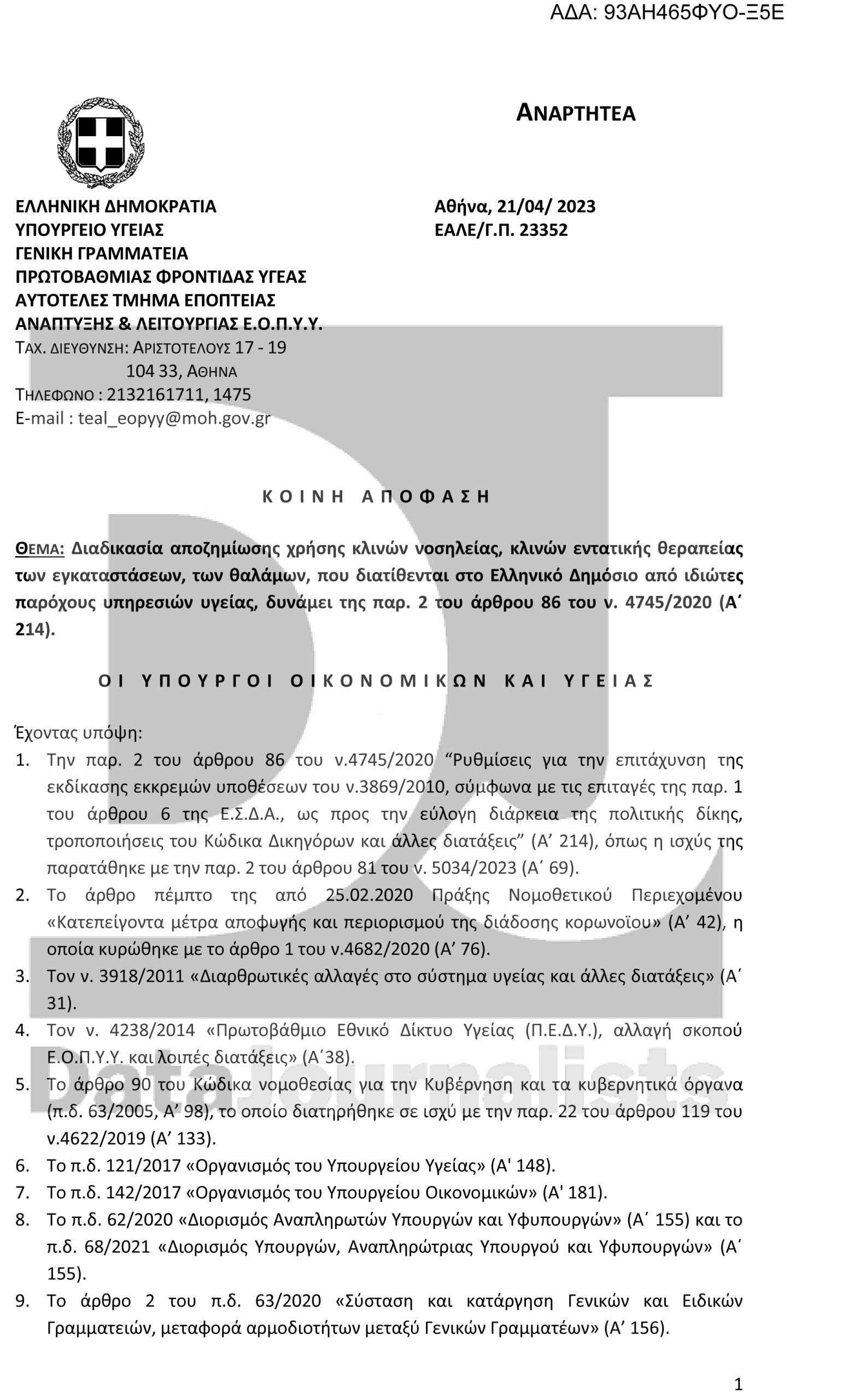
Second decision on compensation in private clinics, against the background of… Covid and double wage costs
The confusion is exacerbated by a new, more recent, decision on 21.4.2023 (EALE/G.P. 23352), signed this time not only by the Minister of Health but also by the Ministry of Finance.
The subject of the decision is: “Procedure for compensation for the use of hospital beds, intensive care beds, wards, available to the Greek State by private health service providers, pursuant to par. 2 of article 86 of Law 4745/2020 (A’ 214)”.
It is worth noting that the government has now withdrawn all measures for the pandemic
It is also recalled that the private health sector did not substantially contribute during the coronavirus outbreak, since the entire burden of combating the pandemic was borne by the NHS. Assistance from private clinics was limited.
Especially in this timing, therefore, it seems inexplicable, if not curious, a decision to “compensate beds for the hospitalization of asymptomatic COVID-19-positive patients” and “compensate beds for the hospitalization of patients with COVID-19”.
In fact, as it is stated, “With this joint ministerial decision, an additional cost is incurred at the expense of the EOPYY budget, the exact amount of which cannot be determined, as it will depend on the rate of disposal of private beds, as well as the type and nature of the incidents.”
The cost will be borne by the EOPYY budget and will be dealt with by the taxpayers: “From the credits of KAE 0673.01E and in case its reinforcement is required, with redistribution of the credits or with an extraordinary subsidy from the budget of the Ministry of Health”.
According to the joint decision, the wage cost will be double (2.09): “In the event that private health providers (private hospitals/clinics and Rehabilitation Centers) provide beds for the hospitalization of patients who are asymptomatic, but positive for COVID-19, private providers are compensated for the above incidents with the daily hospitalization of private clinics, plus the wage cost factor of 2.09”.
In case of availability of beds by private health providers (private hospitals/clinics) for the hospitalization of patients with COVID-19, who show symptoms, the compensation is determined, in accordance with the mechanism of Closed Unified Hospitals, the applicable legislation.
The compensation for the above nursing incidents is carried out by applying the coefficient 2.09 to cover the salary costs, excluding the special medication of the patients for the treatment of COVID-19.
In fact, in case of availability of beds by Rehabilitation Centers of Closed Nursing for the hospitalization of patients with COVID-19, who show symptoms, the compensation is determined according to the daily hospitalization of nursing care of the K.A.A.-K.N. (Presidential Decree 187/2005, A’ 231), increased by 30 euros for COVID-19 protection measures.
However, there is also a provision for non-coronavirus

Specifically, for compensation of beds for hospitalization of patients in private clinics:
- In case of hospitalization beds are provided by clinics/private hospitals for the hospitalization of any other incident (pathological, pulmonary, etc.), except surgical, of patients who do not suffer from COVID-19, now the nursing incident is compensated according to the hospitalization sheet, 180 Euros for daily compensation of the medical staff, and 120 Euros for daily other salary costs.
- In case of hospitalization, beds are available on behalf of clinics/private hospitals for the hospitalization of a surgical incident, which does not fall under Articles 1 and 2 hereof (i.e. patients who do not have COVID-19), the nursing incident is compensated according to the hospitalization sheet, based on the closed consolidated hospitalizations of the incident, to which the salary cost factor of 2.09 is applied.
- Upon commencement of transfer and admission of patients to the available ICU beds, the compensation price is set in the daily hospitalization of par. 8 of article 21 of the EOPYY’s Unified Regulation for Healthcare Benefits (B’4898/2018), increased by the wage cost factor 2.09.
- If surgery is required due to the clinical condition of the patient who is in the ICU, then this is compensated by the price of the closed consolidated hospitalizations of the main disease, in accordance with the applicable legislation, calculated at a wage rate of 2.09 times the price of closed consolidated hospitalizations.
- In their decision, the Ministry of Health and the Ministry of Finance invoke the extraordinary circumstances due to the pandemic: “The need to determine the procedure for the compensation of the use of hospital beds, intensive care beds of the facilities, wards, which are available to the Greek State by private health service providers, due to the extraordinary health crisis conditions that are taking place in the country due to the ongoing pandemic.”
That is, the same government that has withdrawn all measures for the pandemic continues to invoke it for compensation in private clinics and rehabilitation centers.
Government – private health and… Davelis
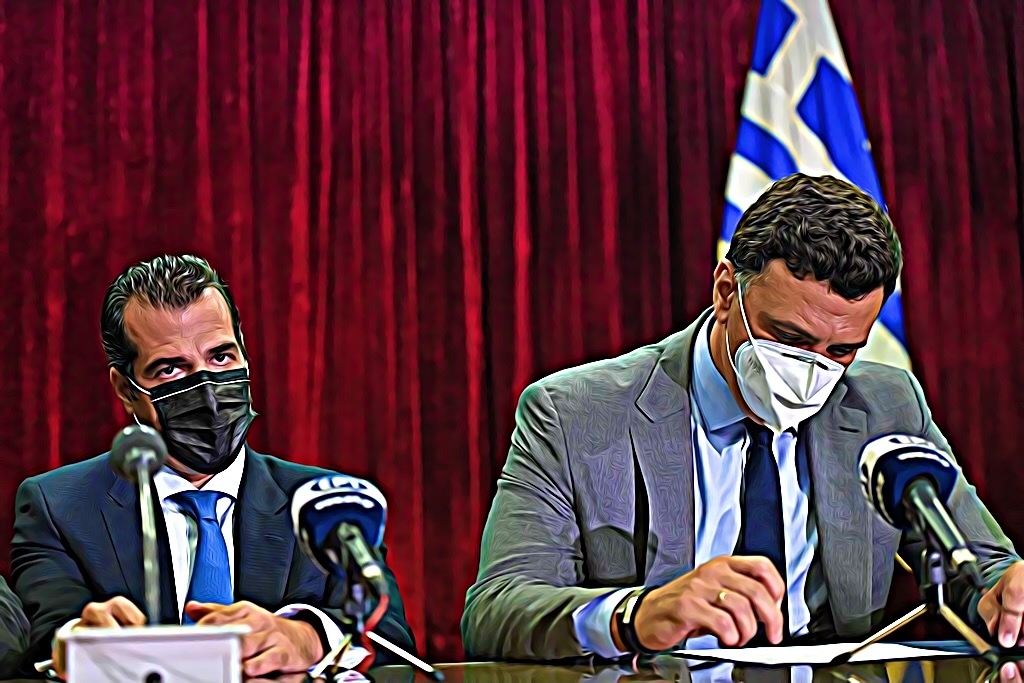
The government has never hidden the excellent relationships it has with the private health sector. It tolerated not contributing as an industry to the coronavirus pandemic, while its executives openly advertised entrepreneurs active in the field. The most striking example of advertising is the Thessalian businessman, Achilleas Davelis. He is the best man of New Democracy MP and former Foreign Minister Dora Bakoyannis, who came to the fore during the years of the pandemic crisis.
Davelis, who has now expanded into football and the media, raised significant funds with the masks for the coronavirus, setting up a factory in record time, from the first days of the March 2020 quarantine, when there were significant shortages. He then received, according to reports, generous subsidies for two new production lines.
On May 6, 2020, speaking in Parliament, Adonis Georgiadis said: “As part of the government’s effort to increase domestic mask production, a company in Larissa invested, with its own money, and we helped in the rapid import of the machines from China, in order to start production in April.”
During the discussion, the minister continued to defend Achilles Davelis, president of the Association of Thessalian Industries and owner of the Animus rehabilitation center.
On 6.8.2021, the Greek Medicines Agency proceeded to recall the masks manufactured by Davelis’ company “due to the existence of risks to human health”.
The Animus Rehabilitation Center is considered one of the largest in Greece and the Balkans. It started its operation in May 2008 and is built on an area of 170 acres, on the 8th km. of the Road Larissa-Trikala. It employs more than 200 health professionals.
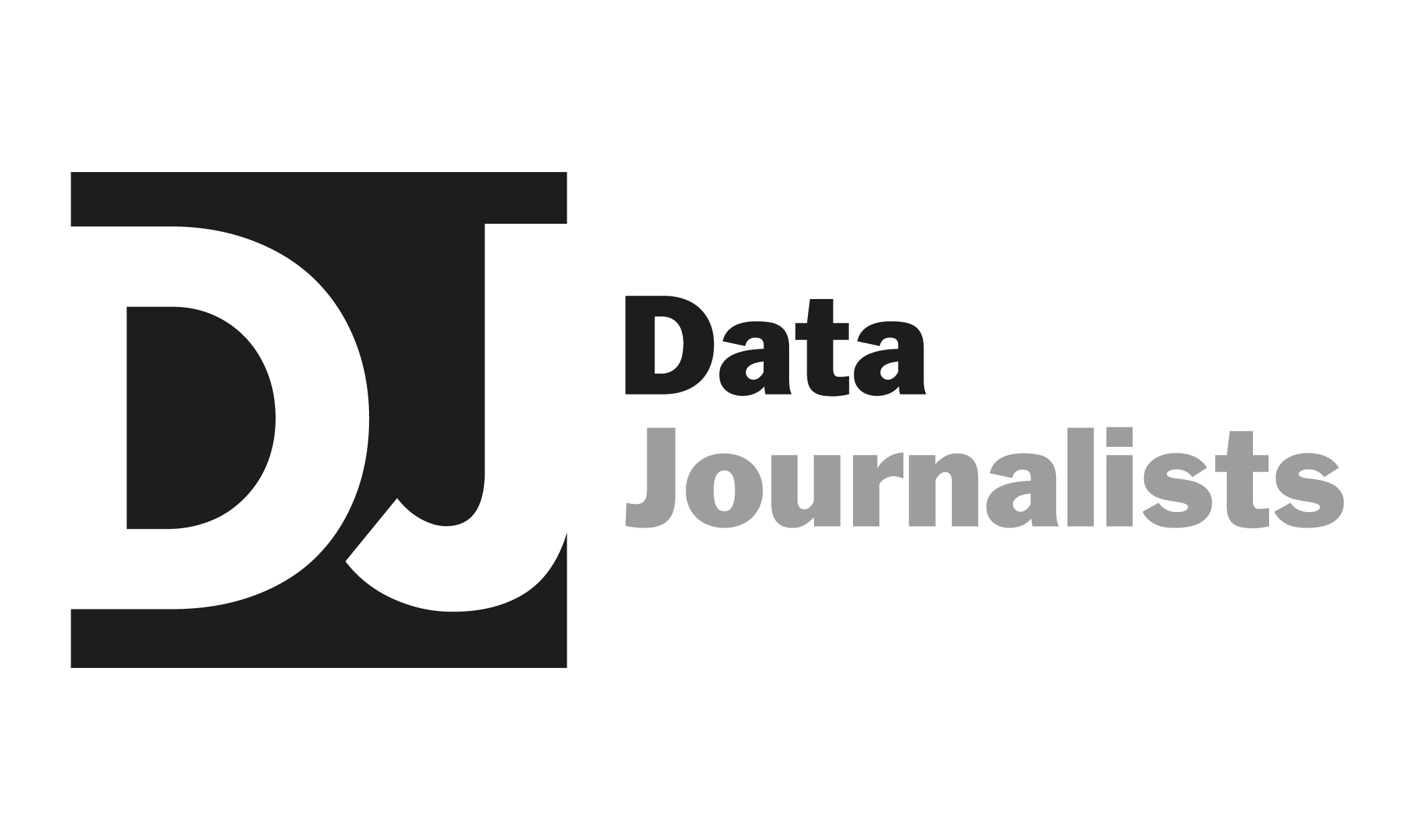


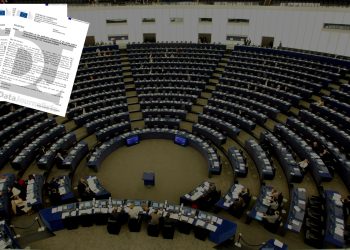




Discussion about this post